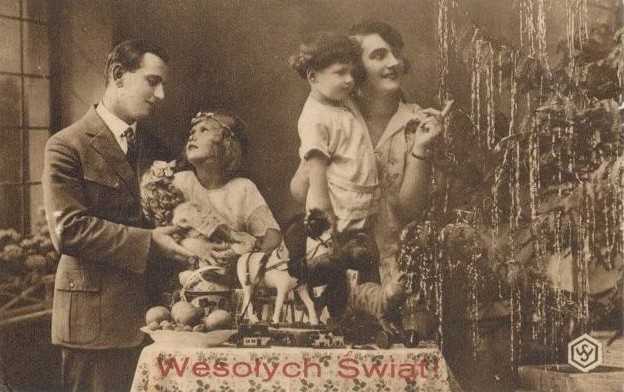By Ben Koschalka
As Poles prepared to celebrate Christmas, questions were raised about traditional gender roles at this time of year, when women are often given special permission to leave work early to prepare the home. Christmas was even used as an excuse for not inviting women to discuss politics on television.
Two days before Christmas Eve, when Polish families traditionally feast on 12 dishes, break the Christmas wafer, share wishes for the year to come and open gifts, the flagship political discussion show on leading broadcaster TVN featured no female panellists.
That was not particularly unusual in Poland’s male-dominated media and political landscapes. But the excuse given by the host, veteran journalist Konrad Piasecki, did raise some eyebrows: “I know that today we have a male line-up on Kawa Na Ławę [the name of the show], but it’s that time of year when women are busy at home.”
.@KonradPiasecki: „Wiem, że dzisiaj w #KawaNaŁawę skład męski, ale to taki czas, gdy kobiety zajęte są w domu” ?♀️
Święta nie są wytłumaczeniem wykluczenia kobiet z mediów! Ale w #KawaNaŁawę brak równej reprez. ♀️ i ♂️ to nie nowość. Gdyby tam zagościła, byłby to świąteczny cud.
— A. Dziemianowicz-Bąk (@AgaBak) December 22, 2019
Agnieszka Dziemianowicz-Bąk, an MP for the New Left party, expressed her frustration at the comments on Twitter. “The holidays are no explanation for the exclusion of women from the media! But the lack of equal representation of [women and men] on Kawa na Ławę is nothing new. If it did appear, it would be a Christmas miracle.”
The controversy over the lack of female representation in such television panels has gained momentum in recent years. Probably the most famous and absurd – but by no means exceptional – example was a discussion of abortion on TVN in which seven men took part but no women.

As Notes from Poland has highlighted on a number of occasions, other broadcasters, including public network TVP, are also repeat offenders in terms of failing to include female representation.
For the last five weeks every single guest has been male on the main Sunday political talk show on state TV.
That's 30 out of 30 (plus male presenters @michalrachon and @KZiemiec) pic.twitter.com/EjrWSngHbf
— Notes from Poland ?? (@notesfrompoland) March 24, 2019
The problem is not confined to television debate panels. Despite promising changes, this year the prestigious Krynica Economic Forum – Poland’s equivalent of Davos – again had twice as many as bishops (two, one of them recently deceased) as women (one) on its advisory council.
A large-scale analysis by Bizzabo in 2018 showed that Poland had the lowest proportion of female speakers (just 10%) at professional events among all the countries it surveyed.
Feminist author Agnieszka Graff examined the issue of under-representation of women in the public sphere in her 2001 book Świat bez kobiet (“A World Without Women”). Last year, a group of women including Graff satirised the absurdities of all-male panels debating issues affecting women by holding their own series of discussions on issues such as use of Viagra and whether hitting men was permissible.
Women discuss male sexual health to highlight absurdity of all-male panels on reproductive issues.
'Men must be protected from Viagra's side effects', 'Erection is gift from God. Viagra interferes with God's plan, is against Catholic morality'. More here: https://t.co/EZ2YrRAzUq pic.twitter.com/bdgbSovivo
— Notes from Poland ?? (@notesfrompoland) January 27, 2018
Piasecki’s comments – and Dziemianowicz-Bąk’s reaction – also address the issue of women’s work and family responsibilities in the run-up to Christmas. Wigilia, as Christmas Eve is know in Poland, is the focus of the festive season, and all the cooking and cleaning needs to be completed before celebrations begin. Yet it is not a public holiday – only the First and Second Days of Christmas, the 25 and 26 December, are.
People therefore usually go to work as usual on 24 December, perhaps leaving slightly early. Unofficially, however, many companies and institutions allow women to go home earlier than their male counterparts – after all, how else would all the cooking and cleaning get done to make sure that the table is ready?
An article in Gazeta Wyborcza reports anecdotal evidence from staff at companies including telecommunications giant T-Mobile that women are released from their duties earlier on Christmas Eve as a “gesture” to make their lives easier. Officially, though, most firms refuse to confirm the practice – perhaps because Article 18 [3a] of the Polish Labour Code makes it illegal to discriminate on grounds of gender.
T-Mobile responded: “As far as we can remember, everybody working in administration, regardless of sex, has had shortened working hours. This never applied only to women. We are committed to zero tolerance for discrimination.”
Only one of the firms approached admitted to having let women out earlier in the past. “But we took the opinions of our staff into account and ended the practice,” Gazeta Wyborcza quotes a company spokesperson as saying.
The report recalls the situation in 2010, when the Solidarity trade union only ever mentioned women in its proposal for shortened working hours in supermarkets on Christmas Eve. According to Gazeta Wyborcza, Senator Jan Rulewski was among those to back the idea, a good old custom of “releasing female staff earlier to prepare the family home”.
Website Wirtualna Polska cites a survey conducted several years ago by TNS OBOP, in which some 83% of Poles – and the vast majority of men – thought that Christmas Eve should be a day off for women.
In the same article, the website reports that such practices still do exist, citing a new employee of an international cosmetics company who was surprised to hear from his boss at the company Christmas party that his female colleagues were excused work on Christmas Eve. “What about the men?” he asked. “Men go as usual – someone needs to be at work, after all,” came the response.
The best solution could be an idea that recurs from time. Why not make Christmas Eve a day off for all, men and women? The Polish People’s Party (PSL) tabled a bill to this effect last year, supported by the Together (Razem) party and others. But it was later quietly dropped. Next Christmas, perhaps?
Main image credit: Wikimedia/Przykuta (under CC BY-SA 3.0)

Ben Koschalka is a translator, lecturer, and senior editor at Notes from Poland. Originally from Britain, he has lived in Kraków since 2005.




















